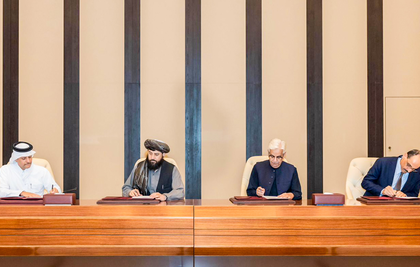Pak, Afghan media report Istanbul talks 'failure' but present different narratives
By IANS | Updated: October 28, 2025 20:10 IST2025-10-28T20:05:48+5:302025-10-28T20:10:21+5:30
New Delhi, Oct 28 Through the three-day Afghanistan-Pakistan follow-up meeting in Istanbul -- aimed at implementing the Doha ...

Pak, Afghan media report Istanbul talks 'failure' but present different narratives
New Delhi, Oct 28 Through the three-day Afghanistan-Pakistan follow-up meeting in Istanbul -- aimed at implementing the Doha agreement of October 18-19 -- accounts from Kabul appeared as cautious hedging around binding concessions while dispatches from Islamabad read as pressure-based diplomacy.
Though the media in both countries framed the negotiations, mediated by Turkiye and Qatar, as a high-stakes, short-term diplomatic effort, but emphasised different fault lines.
But in the end, both narratives converged on a basic outcome, that no joint agreement or signed document emerged from Istanbul talks, and the fragile ceasefire declared earlier at the Pakistan-Afghanistan border remained the only concrete concession followed by lingering distrust.
Reports originating from either side quoted Pakistan’s claim of terror groups being present on Afghanistan soil but backed, or denied their existence as per the respective official stand.
Reiterating the country’s position, Pakistan’s Dawn news reported that during the Istanbul negotiations, most of the issues following the Doha talks were mutually sorted by the two sides.
However, it added, the mechanism for verifiable action against alleged terrorist groups operating from inside Afghanistan remained a point in contention.
Kabul’s Tolo News, mentioning Islamabad’s claim of Taliban harbouring Tehreek‑e‑Taliban Pakistan (TTP), reported that during the talks, the Pakistani delegation asked the Afghan side to accept that Islamabad “has the right to carry out attacks on Afghan soil during TTP assaults”.
It also claimed that “Afghanistan made every effort to hold constructive talks and find a solution to the problem, but the Pakistani side did not appear to share this intention”.
It quoted an unnamed source sharing “there seemed to be no coordination within the Pakistani delegation, and instead of presenting clear arguments, they appeared intent on retreating and leaving the negotiating table”.
The Taliban delegation apparently reiterated their leadership’s stand that the TTP is not an Afghan problem but a Pakistani one. They reportedly emphasised that Pakistan’s internal security is a domestic matter, “while the Afghan side remains committed to ensuring that no one uses its territory to harm other nations”.
The versions also varied on the role played by the negotiating teams. Dawn quoted its sources saying that while Turkiye understands Islamabad's concerns, the Taliban remained unwilling to commit. But Afghanistan’s Pajhwok news claimed to the contrary. According to its own source, “even the mediators” from Turkiye and Qatar “were surprised and upset by the behaviour of the Pakistani side during the talks”.
It alleged “the head of the Pakistani team, who was a very ill-mannered person, requested from the Afghan side that you bring all the groups that carry out attacks in Pakistan under Afghanistan’s control…”
The report added that its source said that “this request also surprised the mediators”.
Media reports from both countries appeared to agree that the principal factor that failed to produce the much-anticipated breakthrough was the TTP’s presence in Afghan territory.
However, news outlets in Kabul reported the deadlock arising over verifiable action against them, while from Islamabad came claims that the Taliban refused to give a written verification over such element’s existence in Afghanistan.
The divergent emphases shaped public perceptions in both countries, increasing domestic pressure on negotiators to adopt maximalist postures. The tone was set at the onset of the Istanbul talks by Pakistan's Defence Minister Khawaja Muhammad Asif, who had led his side to the Doha talks earlier.
He stated that the ceasefire agreement with Afghanistan is conditional, adding that the agreement depends on Kabul’s ability to control opposition groups, those who, according to him, use Afghan soil to launch attacks on Pakistan.
Disclaimer: This post has been auto-published from an agency feed without any modifications to the text and has not been reviewed by an editor
Open in app